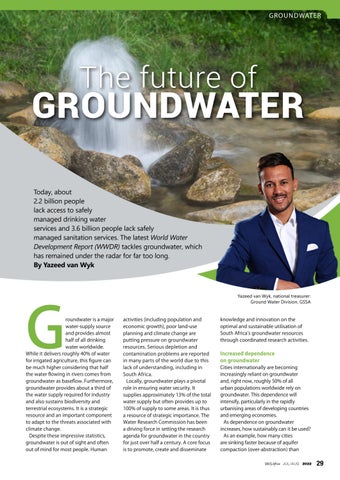GROUNDWATER
The future of
GROUNDWATER Today, about 2.2 billion people lack access to safely managed drinking water services and 3.6 billion people lack safely managed sanitation services. The latest World Water Development Report (WWDR) tackles groundwater, which has remained under the radar for far too long. By Yazeed van Wyk
G
roundwater is a major water-supply source and provides almost half of all drinking water worldwide. While it delivers roughly 40% of water for irrigated agriculture, this figure can be much higher considering that half the water flowing in rivers comes from groundwater as baseflow. Furthermore, groundwater provides about a third of the water supply required for industry and also sustains biodiversity and terrestrial ecosystems. It is a strategic resource and an important component to adapt to the threats associated with climate change. Despite these impressive statistics, groundwater is out of sight and often out of mind for most people. Human
Yazeed van Wyk, national treasurer: Ground Water Division, GSSA
activities (including population and economic growth), poor land-use planning and climate change are putting pressure on groundwater resources. Serious depletion and contamination problems are reported in many parts of the world due to this lack of understanding, including in South Africa. Locally, groundwater plays a pivotal role in ensuring water security. It supplies approximately 13% of the total water supply but often provides up to 100% of supply to some areas. It is thus a resource of strategic importance. The Water Research Commission has been a driving force in setting the research agenda for groundwater in the country for just over half a century. A core focus is to promote, create and disseminate
knowledge and innovation on the optimal and sustainable utilisation of South Africa’s groundwater resources through coordinated research activities.
Increased dependence on groundwater
Cities internationally are becoming increasingly reliant on groundwater and, right now, roughly 50% of all urban populations worldwide rely on groundwater. This dependence will intensify, particularly in the rapidly urbanising areas of developing countries and emerging economies. As dependence on groundwater increases, how sustainably can it be used? As an example, how many cities are sinking faster because of aquifer compaction (over-abstraction) than J UL / A U G 2022
29

















